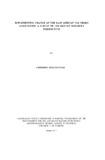| dc.description.abstract | It has become apparent that change in organisations do not always produce desired
outcomes and therefore this has led to increased efforts to implement change
successfully. This study aims at surveying the Kenyan members* perspectives on
implementing change at the East African Tea Trade Association. Literature was reviewed
that covered both theoretical and published studies on the need for successful
implementation of change and possible challenges in implementing change. Key factors
identified by many scholars include leadership of change, organisation culture,
organisation power and politics, role of change agents and resistance to change.
Implementing change successfully is increasingly seen as an essential part of
management that needs proper planning and involvement of stakeholders. An
organization such as the East African Tea Trade Association draws membership from
eleven African countries with diverse and multi cultural base comprising tea producers,
buyers, packers, brokers and warehouses. The study adopted a descriptive survey design
with a 30% sample of Kenyan member's population and further used disproportionate
stratified sampling method. Structured questionnaires were administered to 40 senior
managers of respective companies. Quantitative data was analysed using SPSS and
qualitative data using content analysis. The findings of this study demonstrated that
members had a clear understanding of the change program, were well informed about the
change but were not involved in planning. Further results indicate that most members felt
that there was need to change but gradually. They favored change in technology notably
electronic transmission of tea catalogues and the new tea payment system. Most members
however felt that the organisation resource and characteristic needed to be maintained
xi
was the old auction system as opposed to change towards electronic auction. Notable
challenges that members expressed include resistance to change, lack of involvement
during planning, inability to align organisation culture and change, organisation power
and politics. Members responded to challenges positively with the understanding that
change was inevitable. However, some of the members resisted change while others
requested for more consultative forums so as to collectively chart the way forward. In
conclusion, for successful implementation of change, there is need to inform stakeholders
about intended change, the need to involve them during planning, having a clear
understanding about the underlying power and politics of an organisation, leading change
by communication and involvement and appreciating organisation culture to reduce on
delays and resistance to change. Time factor was a limitation to this study and given the
its nature, the unwillingness of some respondents to divulge their views on
implementation of change | en_US |

